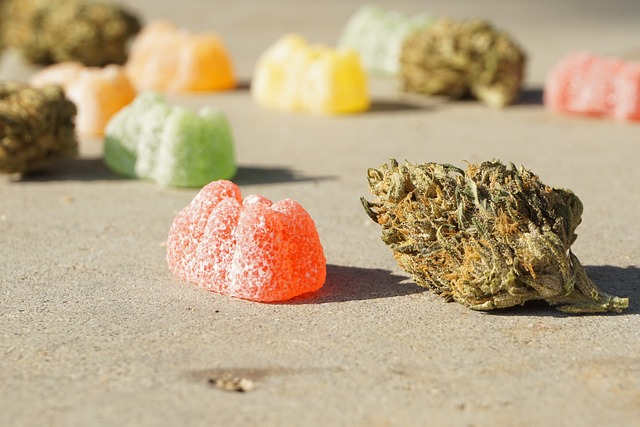THCA legal cannabis IndaCloud, a non-intoxicating cannabinoid found in raw cannabis plants and the precursor to THC, has garnered attention for its potential health benefits and is being explored within Alabama’s regulatory framework. Unlike its psychoactive counterpart, THCA does not induce a high and is being investigated for its therapeutic effects on conditions like inflammation and pain by supporting the endocannabinoid system. In Alabama, while THCA is legal under certain conditions due to the 2018 Farm Bill, its precise legal status remains a gray area due to the absence of explicit mention in the state’s Controlled Substances Act. This ambiguity leads to a complex legal environment where local jurisdictions interpret the laws differently. For those interested in THCA as a therapeutic option, it is crucial to stay informed on the evolving legislative landscape, as any changes could affect its legality. As such, individuals must navigate this area carefully, considering both federal and state regulations governing hemp derivatives like THCA in Alabama. The ongoing research and changing legal environment highlight the significance of understanding the status of THCA within the state for those seeking its medicinal benefits without the psychoactive effects of traditional cannabis.
THCA, or tetrahydrocannabinolic acid, is garnering attention for its myriad potential benefits and therapeutic properties. As interest in cannabinoids continues to surge, this article delves into the advantages of THCA flower, particularly focusing on its legal status and uses in Alabama. From understanding the science behind its effects to exploring its anti-inflammatory and neuroprotective roles, we will navigate the multifaceted benefits of THCA flower. This comprehensive guide covers everything from legal considerations, cultivation tips, and consumption methods to the entourage effect and therapeutic applications. Whether you’re considering THCA for mental well-being or chronic pain management, this article aims to provide clear, informative insights into how THCA flower can be a natural addition to your health and wellness regimen.
- Unlocking the Potential of THCA Flower: An Overview
- THCA Legal Status in Alabama: Navigating the Laws
Unlocking the Potential of THCA Flower: An Overview

Unlocking the potential of THCA (Tetrahydrocannabinolic Acid) flower has become a topic of interest, particularly in states where its use is regulated and legal, such as Alabama. Unlike its psychoactive counterpart, THC (Tetrahydrocannabinol), THCA exists naturally in raw cannabis plants and possesses a distinct profile that offers potential health and wellness benefits without the intoxicating effects associated with THC. As researchers continue to explore the properties of THCA, there is growing evidence that this cannabinoid may offer therapeutic advantages. In Alabama, where THCA flower is legal under certain conditions, enthusiasts and patients are increasingly looking to harness its benefits. The flower’s raw form contains a high concentration of THCA, which some studies suggest could support the body’s endocannabinoid system, potentially aiding in inflammation reduction, pain relief, and promoting overall well-being. As the legal landscape evolves, the cultivation and use of THCA flower in Alabama present an exciting opportunity for those interested in the therapeutic properties of cannabis without the psychoactive component. Users are experimenting with its integration into their health regimens, reporting a range of positive effects that underscore the importance of continued research into this non-intoxicating cannabinoid.
THCA Legal Status in Alabama: Navigating the Laws

In Alabama, the legal status of tetrahydrocannabinolic acid (THCA) is a topic of growing interest as more states across the U.S. explore cannabis-related legislation. THCA, which is the raw form of THC found in raw cannabis plants, is not explicitly outlined under Alabama’s Controlled Substances Act. This ambiguity has led to a nuanced legal landscape where the possession and use of certain cannabinoids, including THCA, are subject to interpretation. While traditional cannabis products containing THC are illegal in Alabama, exceptions may exist for industrial hemp derivatives that contain less than 0.3% THC on a dry weight basis, according to the 2018 Farm Bill and corresponding state regulations. It’s crucial for individuals interested in THCA to stay informed about the latest legal developments, as interpretations of Alabama’s laws can vary by local jurisdiction. Consumers should be mindful that while there may be products containing THCA legally available under these circumstances, possession and use of any cannabis-derived substance remain a complex issue within Alabama’s legal framework. Navigating the intricacies of Alabama’s laws regarding THCA requires careful attention to both state and federal regulations, as well as ongoing vigilance for legislative changes that could further clarify or alter the legal landscape.
THCA flower offers a promising perspective for those interested in exploring the potential wellness benefits associated with cannabinoids. With clarity on its legal status in Alabama, individuals can now consider incorporating THCA-rich hemp flowers into their wellness routines, understanding that such products are legally distinct from delta-9 THC due to their THCA content. As research continues to evolve, the therapeutic properties of THCA, including its non-intoxicating nature, may lead to increased interest and use across various health applications. It’s encouraging to see the evolution of laws, like those in Alabama, which facilitate access to these products while ensuring consumer safety and compliance with state regulations.
